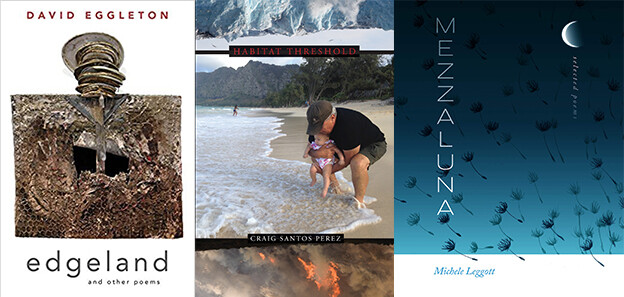
Between kindness and precarity
Orchid Tierney

Orchid Tierney reviews three titles that engage with Anthropocene landscapes.
Edgeland and other poems, David Eggleton (Otago University Press, 2018)
With a psycho-geographic gaze on Aotearoa’s landscape, Edgeland is a rich oratory-inflected collection. Split into five sections, Eggleton’s poems wrestle with history, settler and tourist colonialism, and pop culture, as well as climate change and the Anthropocene — or the “anthrocene,” as the poet prefers to call it. In the classroom, this collection would pair well with Craig Santos Perez’s recycled poems from his most-recent book Habitat Threshold. For example, Eggleton’s “The Smoking Typewriter” rewrites William Blake’s “The Tyger,” while “Moa in the Mātukituki Valley: A Cento” meshes the voices of James K. Baxter, Allen Curnow, and Hone Tuwhare, among others. But the voice in Edgeland is entirely Eggleton’s. Ever the skilful performer, Eggelton writes final lines of each poem that never fail to deliver their punch: “We live for earth’s breath, like the wind, the dust” and “you’ll never get out, get out, / never get out of this poem alive!”
Habitat Threshold, Craig Santos Perez (Omnidawn, 2020)
We are reminded in this collection that the Anthropocene is the era of resource extraction from animal, human, and environmental bodies. On the ivory trade, the writer notes for example: “Warlords will sell this ‘white gold’ to be carved into jewellery, relics, and art, / then smuggled across the planet, / our man-made elephant graveyard.” Sometimes we don’t know whether to laugh or cry with these poems. “This is just to say,” a rewriting of the William Carlos Williams poem, invites us to do both to stave off the insanity of our bioengineered Anthropocene. Yet even as climate change and ocean pollution are foreboding presences in these poems, Santos Perez unsettles disaster with familial images of care as a kind of radical desire to reintegrate with the biosphere: “Outside, my dad grills meat over charcoal; / inside my mom steams rice and roasts / vegetables. They’ve travelled from California, / where drought carves trees into tinder.” This poetry is formally inventive and empathetic. Lines, such as “Love is our wildest / oceanic instinct” and “a rainbow arcs across the valley :: / may it touch :: everywhere :: into music,” underscore poetry’s power to build and sustain a humane economy of kindness.
Mezzaluna: Selected Poems, Michele Leggott (Wesleyan University Press, 2020)
Mezzaluna brings together selected poems from Leggott’s collections published between 1988 and 2017. This collection reveals the poet’s capacity to imagine intense worlds and lyrical surfaces through sound and language when light itself is fading: “the dove wakes me each day / koo / koo / koo koo-roogh” and “my eyes were sealed up / but my ears caught the sound.” While her poetry is not associated with the kind of ecological consciousness that we see in Santos Perez and Eggleton, lines like “Rose and peony buds and tongue / ichthyous tumble honey and pearl” and “I stood in my garden pulling loquats off the tree and eating them to be full of spring” reveal Leggott’s concentrated language that externalizes thick semblances and sensuous textures from interior worlds.